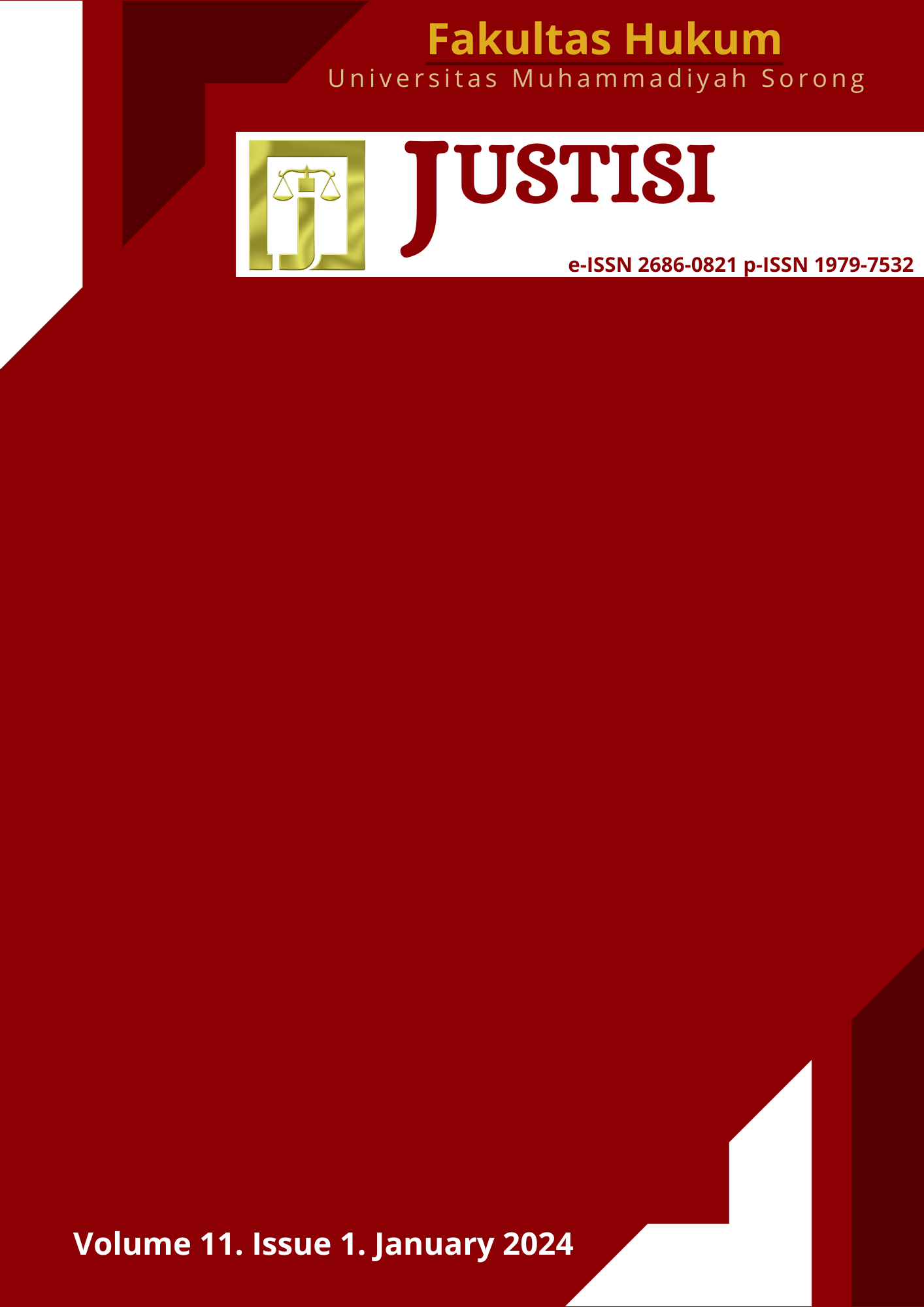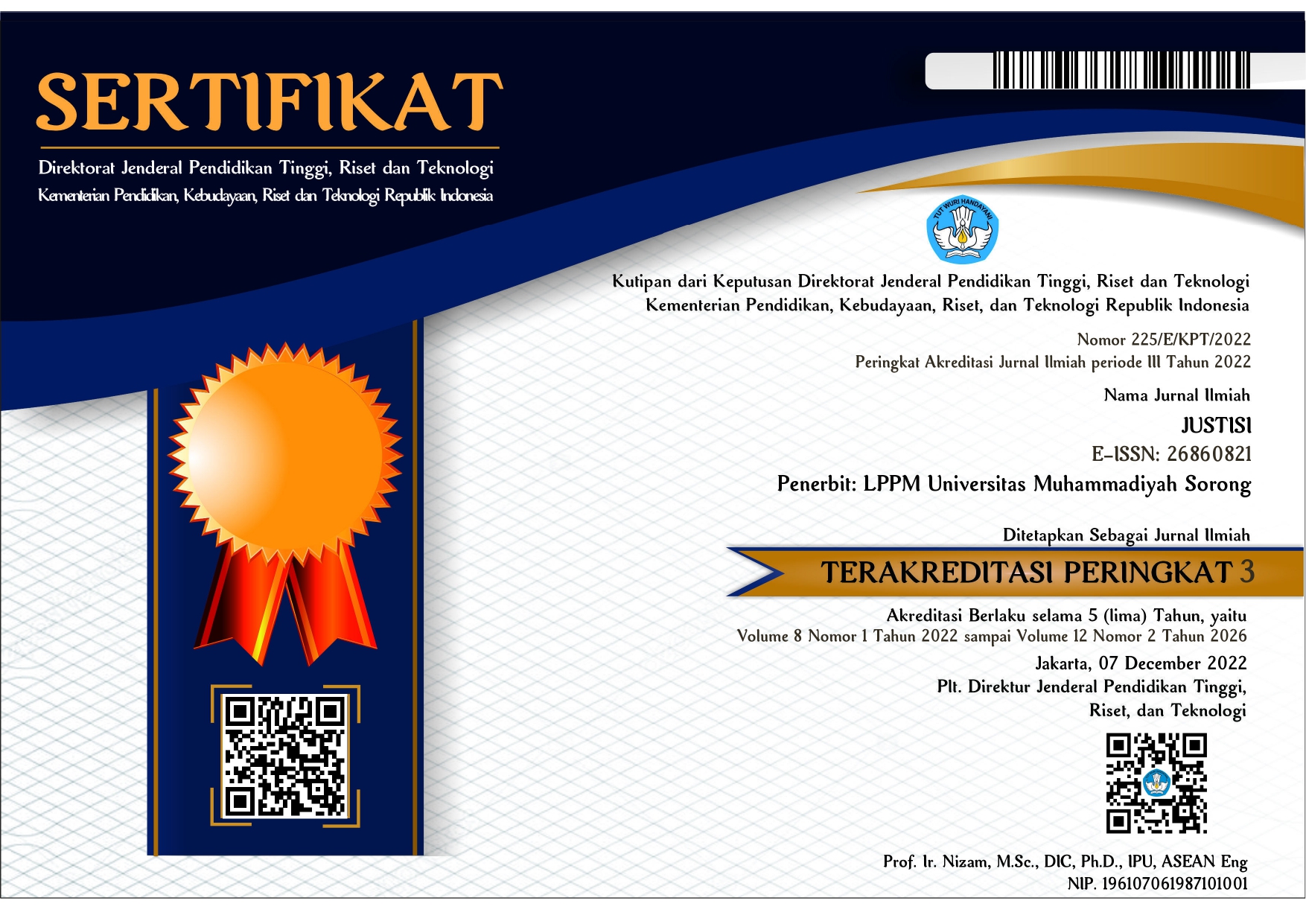Criminal Fines Issuing Tax Invoices Not Based On Actual Transactions With More Than One Perpetrator
Abstract
Criminal fines in the case of issuance of tax invoices that are not based on actual transactions (TBTS) aim to recover losses of state revenue, but in the event that there is more than one perpetrator, the fines applied cannot be applied equally to each perpetrator because the fines applied become multiple. This writing is prepared to analyze the application of criminal fines for the issuance of TBTS tax invoices involving more than one perpetrator in the perspective of legal objectives. The research method used is normative legal research with a case study approach and a conceptual approach using the reference of Development Law Theory. This research is a new contribution to legal development in the application of criminal fines in the criminal offense of issuing TBTS tax invoices with more than one perpetrator. This writing concludes that the application of criminal fines in the case of issuance of TBTS tax invoices with more than one perpetrator is carried out proportionally and objectively according to the benefits or benefits obtained by each perpetrator in order to fulfill the principles of legal certainty, justice and expediency. The absence of rules regarding the mechanism for the application of criminal fines for the issuance of TBTS tax invoices with more than one perpetrator is an obstacle to efforts to apply criminal fines as a recovery for losses of state revenue.
References
Bambang Ali Kusumo, 2009, Legal Sanctions in the Field of Taxation, Journal of Legal Discourse, Vol 8, No. 2.
E. Fernando M. Manullang, 2016, Legism, Legality and Legal Certainty, Jakarta: Kencana.
Gabrila Christy Mumek, 2002, Indonesian Tax Criminal Sanctions and Their Implications for Taxpayer Compliance, Indonesian Multidisciplinary Journal, Vol. 1 No. 4.
I Made Walesa Putra, Marcus Priyo Gunarto, Dahliana Hasan, 2002, Taxpayer Criminalization for Violation of Tax Obligations (Perspective of General Provisions of Tax Procedure Law)”. Udayana Master Law Journal, Vol. 11 No. 1.
IndraAgus Setyowati, “Assistance and Participation in Child Rape Cases”, Jurnal Media Iuris, Volume 1 Number 2, June 2018.
Lilik Mulyadi, Theory of Development Law Prof. Dr. Mochtar Kusumaatmadja, SH, LL.M. An Analytical Descriptive Study,https://badilum.mahkamahagung.go.id
Mahrus Ali, 2011, Basics of Criminal Law, Jakarta: Sinar Grafika.
Mochtar Kusumaatmadja, no year, Functions and Development of Law in National Development, Bandung: Institute for Legal and Criminology Research, Faculty of Law, Padjadjaran University, Binacipta Publisher.
Mochtar Kusumaatmadja, 1986, Legal Development in the Framework of National Development, Bandung: Binacipta.
Mochtar Kusumaatmadja, 2002, Legal Concepts in Development (Collection of Written Works), Alumni Publisher, Bandung.
Mudzakkir, 2011, Criminal Law Regulation in the Field of Taxation and Its Relationship with General and Special Criminal Law, "Journal of Legislation, Vol. 8, No. 1.
Muhammad Djafar Saidi and Eka Merdekawati, 2012, Crimes in the Field of Taxation, Jakarta: Raja Grafindo Persada.
PAF Lamintang & Djisman Samosir, 2019, Special Offenses: Crimes Directed Against Property Rights and Other Rights Arising from Property Rights, Bandung: Nuansa Aulia.
PhilipM. Hadjon, 2005, Introduction to Indonesian administrative law, Yogyakarta: Gadjah Mada University Press.
R. Santoso Brotodihardjo, 2003, Introduction to Tax Law, Bandung: Refika Aditama.
Slamet Riyadi and Suparnyo, Settlement of Criminal Acts of Negligence in Traffic Resulting in Serious Injury to Others in Case Number 208/Pid.Sus/2018/Pn Kds, 2023, Suara Keadilan Journal, Vol. 24 No. 1.
Sjahran Basah, 1992, Legal Protection Against State Administrative Actions, Bandung: Alumni.
Sonny Pungus, Theory of the Purpose of Law, http://sonny-tobelo.com/2010/10/teori-wenang-hukum-gustav-radbruch-dan.html, accessed on June 30, 2024.
Law of the Republic of Indonesia Number 6 of 2023 concerning the Stipulation of Government Regulation in Lieu of Law Number 2 of 2022 concerning Job Creation.
Law of the Republic of Indonesia Number 7 of 2021 concerning Harmonization of Tax Regulations.
Law Number 11 of 2021 concerning amendments to Law Number 16 of 2004 concerning the Attorney General's Office of the Republic of Indonesia
Law Number 6 of 1983 concerning General Provisions and Tax Procedures as amended several times, most recently by Law of the Republic of Indonesia Number 16 of 2009 concerning the Stipulation of Government Regulation in Lieu of Law Number 5 of 2008 concerning the Fourth Amendment to Law Number 6 of 1983 concerning General Provisions and Tax Procedures to Become Law.
Government Regulation of the Republic of Indonesia Number 50 of 2022 concerning Procedures for the Implementation of Tax Rights and Fulfillment of Tax Obligations.
Regulation of the Attorney General of the Republic of Indonesia Number 7 of 2020 concerning the Second Amendment to the Regulation of the Attorney General Number PER-027/A/JA/10/2014 concerning Guidelines for Asset Recovery
Circular Letter of the Attorney General of the Republic of Indonesia Number: B-116/A/JA/07/2015 dated 31 July 2015 concerning the Rescue of State Financial Losses in Handling and Settlement of Corruption Cases.
Published
How to Cite
Issue
Section
License
Copyright (c) 2025 Anggiat Sautma, Sigid Suseno, Amelia Cahyadini

This work is licensed under a Creative Commons Attribution-ShareAlike 4.0 International License.









